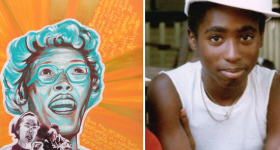Senator Daniel Inouye (center) and Rep. Mazie Hirono (right). Photo by USFWS Pacific, cc, Flickr
Were you ever that kid who dreamed of one day becoming the President of the United States? (I bet you were probably really annoying, too, weren’t you.) But did you think it was impossible because you didn’t look like the other Presidents? (To be fair, you probably didn’t want to look like Taft.) Or because you came from an immigrant background?
Well, consider your childhood dream a viable possibility. In recent years, a record number of leaders has emerged from the Asian American community.
In the Pacific, you have people like US Rep. Mazie Hirono (D) of Hawaii. On the east coast, you have State Rep. William Tong (D) of Connecticut. Both Hirono and Tong are running for Senate seats this year. There’s also New York City Comptroller John Liu, who was elected in 2009. On the west coast, there’s Oakland Mayor Jean Quan, elected in 2010 and who has had something of an embattled tenure. Most recently, San Francisco's mayoral race saw a number of Asian American candidates. Ed Lee eventually prevailed; his win, in particular, was attributed to the record number of the Asian American electorate who turned out to vote for him.
In November 2011, USA TODAY reported that a record number of Asian Americans are running for Congress this year. At least 19 candidates with an Asian American background have declared their bids for Congress in the 2012 election cycle -- up from only eight candidates in 2010. Additionally, a UCLA study recently found that we currently have more elected or appointed Asian American officials than ever before.
So hang onto that White House dream. There’s no better time to act than now. According to the US Census Bureau, there are roughly 17.3 million residents of Asian descent in the US, which makes up about 5.6 percent of the population. Not only that, but we are also the fastest-growing minority population, growing 46 percent between the 2000 and 2010 censuses.
Combining that population growth with the burgeoning political activity, Asian Americans are poised to change the political landscape in a big way. When census statistics show that one in five Americans have close ties to immigrants, either being an immigrant themselves or have at least one parent who was one, it’s increasingly necessary that our political leaders can reflect that immigrant perspective.
Sayu Bhojwani, the founding director of the New American Leaders Project, is certain that her immigrant background helped her to better serve her constituents. In her New York Times article "Year of the Immigrant," she writes, “When I served as commissioner of immigrant affairs under Mayor Bloomberg, I served as a New Yorker, but with the formative experiences of an immigrant. Looking through that lens, I could help devise and revise policies in ways that native-born New Yorkers sometimes couldn’t. I understood intuitively what it meant to speak a language other than English at home or to be afraid to call the police to report a crime. My unspoken, instinctive comprehension of the needs of new Americans was a gift I brought to my position then, and I was able to reflect those experiences in policy with ease and pride.”
The main purpose of the New American Leaders Project is to train first- and second-generation immigrants for civic service. “While the end goal is to help more minorities run for office, it is also involved in raising awareness about the word ‘immigrant’ and their importance to the fabric of our democracy,” said New American Leaders Project Media and Communications consultant Nina Spensley. “It’s also reminding people that the immigrant experience is an American experience.”
One of the upcoming trainings will be held in California. “There is quite an underrepresentation of Asian Americans in Southern California,” she noted. “The Latino and Asian relations are super important here in California.” To that end, the Project will be holding a conference in the Los Angeles on April 28 and 29. But this is by no means an Asian American-only initiative; there's an overall underrepresentation of people of color in political office. More minority participation in politics benefits all minorities, not just one.
If you’re interested in possibly entering the political fray and want some pointers, you can check out the conference schedule and get an application on the New American Leaders website.
First Asian American President? 1600 Pennsylvania Ave might be closer than you think.
--
More reading:
Asian Americans: A Growing Political Force
How do you create immigrant-friendly politicians?
Indian-American voters increasingly gain political clout ahead of US elections
[An earlier version of this story mistakenly included Rep. Mazie Hirono as from the east coast. She represents Hawaii -- a state decidedly not on the east coast! We regret the error.]










Comments